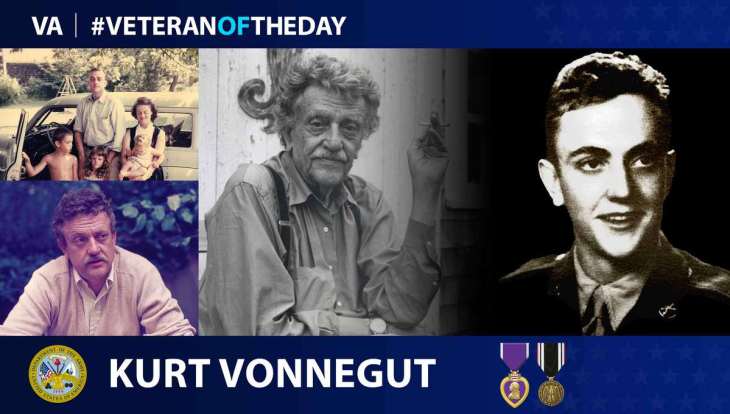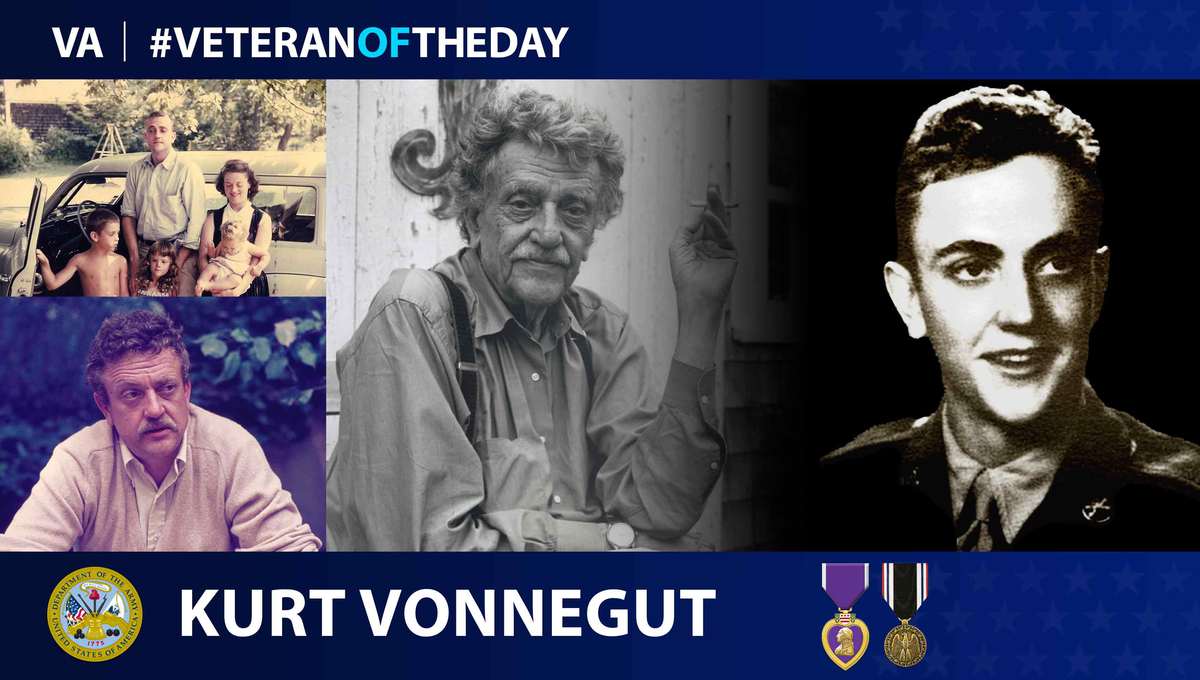December 17, 2022: Kurt Vonnegut

Kurt Vonnegut Jr. was born in Indianapolis, Indiana, in November 1922. He began attending Cornell University in New York in 1940, where he majored in biochemistry and worked as a writer and editor for the campus newspaper. However, Vonnegut’s grades were poor, and he withdrew from the university in his junior year following a severe bout with pneumonia.
Vonnegut enlisted in the Army in November 1942, during World War II, and went basic training in early 1943. Since Vonnegut had been part of the Reserve Officers’ Training Corps (ROTC) and had earned some college credit, he was enrolled in the Army Specialized Training Program (ASTP), through which he studied mechanical engineering at the Carnegie Institute of Technology (now Carnegie Mellon University) and the University of Tennessee. He was stationed at Camp Atterbury, near Indianapolis, and visited home on the weekends.
In late 1944, Vonnegut deployed to Europe as part of the 423rd Infantry Regiment, 106th Infantry Division. He served as a battalion intelligence scout, venturing ahead of the front lines to report enemy positions. In December, during the Battle of the Bulge, his unit was overrun by German forces, and he was captured. He and dozens of other prisoners of war were sent to a labor camp in the German city of Dresden, where they were put to work manufacturing vitamin supplements.
On Feb. 14, 1945, Allied forces firebombed Dresden, destroying much of the city. Vonnegut and other prisoners survived because they had been working in an underground meat locker. Afterward, they were forced to retrieve and burn thousands of bodies of people who had been killed in the attack. Vonnegut was liberated by the Red Army in May 1945.
After the war, Vonnegut attended graduate school at the University of Chicago, where he studied anthropology. He worked as a reporter for the Chicago City News Bureau and later moved to New York after accepting a position as a public relations writer for General Electric. However, he was dissatisfied with public relations work, preferring to submit short stories to magazines and resigned in 1951 to become a full-time fiction writer. Throughout his career, he authored a total of 14 novels, as well as several plays and short story collections.
Vonnegut was profoundly affected by his wartime experiences, which had a strong influence on his writing. His sixth and most successful novel, “Slaughterhouse-Five,” was named for the meat locker where he and his fellow prisoners were housed in Dresden and contains a fictionalized account of the firebombing of the city.
“The destruction of Dresden was my first experience with really fantastic waste,” Vonnegut said. “To burn down a habitable city, and a beautiful one at that… I was simply impressed by the wastefulness, the terrible wastefulness, the meaninglessness of war.”
Vonnegut was the recipient of both a Purple Heart and a Prisoner of War Medal. The asteroid 25399 Vonnegut bears his name.
Vonnegut died on April 11, 2007, at the age of 84.
We honor his service.
Nominate a Veteran
Do you want to light up the face of a special Veteran? Have you been wondering how to tell your Veteran they are special to you? VA’s “Honoring Veterans” social media spotlight is an opportunity to highlight your Veteran and his/her service.
It’s easy to nominate a Veteran. Visit our blog post about nominating to learn how to create the best submission
Writer: Stephen Hill
Editors: Nicolas Nunnally, Alexandra Kaiser
Researchers: Timothy Georgetti, David Charles Deprez
Graphic Designer: Philip Levine
Topics in this story
More Stories
This week’s Honoring Veterans Spotlight honors the service of Marine Corps Veteran Rodney Sickmann, who served in Iran.
This week’s Honoring Veterans Spotlight honors the service of Army Veteran Mary Edwards Walker.
This week’s Honoring Veterans Spotlight honors the service of Marine Corps Veteran Opha May Johnson, who served during World War I.






A very interesting biographical sketch of Kurt Vonnegut. I enjoyed reading Breakfast of Champions and Slaughterhouse-Five. I was not aware of the meat locker in Dresden. The information you provided correlates with the setting and helped me to understand the descriptions found in Vonnegut’s style of writing. Vonnegut is to be commended for his military service, especially because he was a POW and survived the bombing of Dresden.